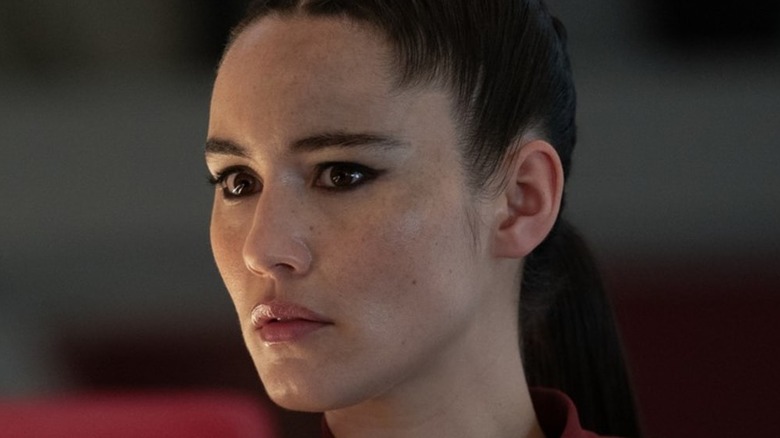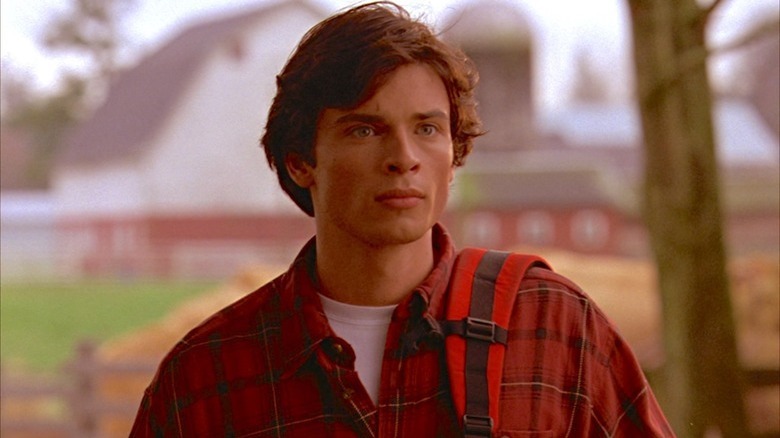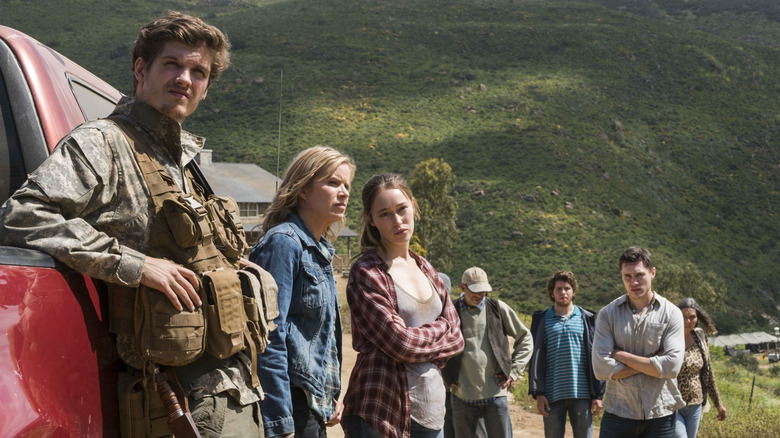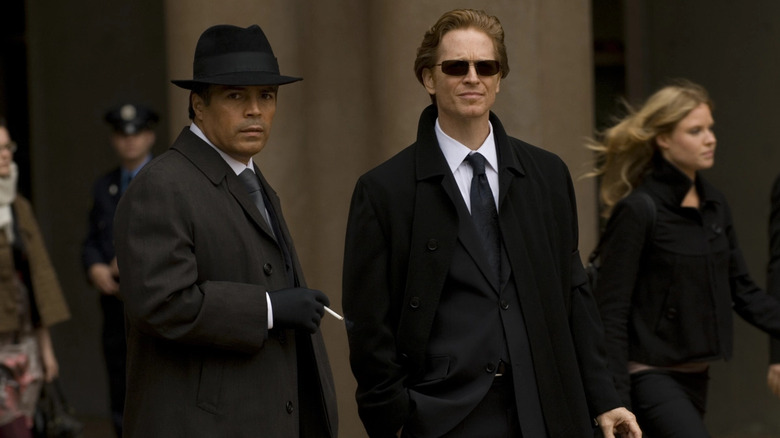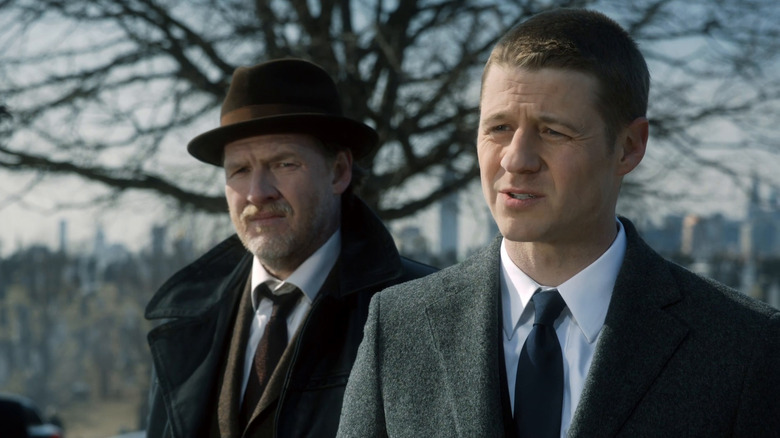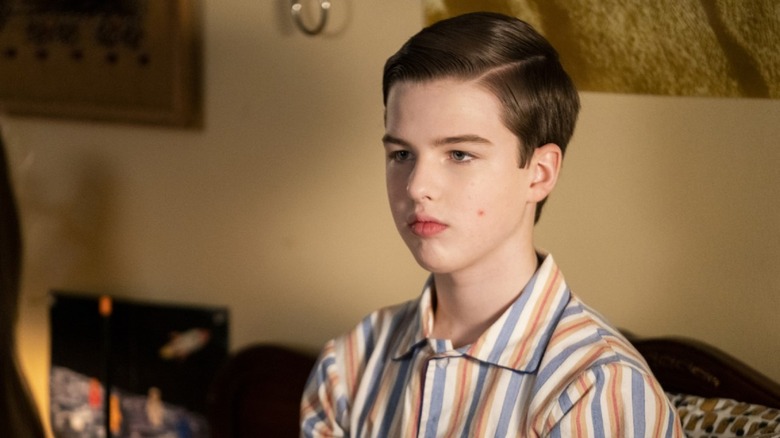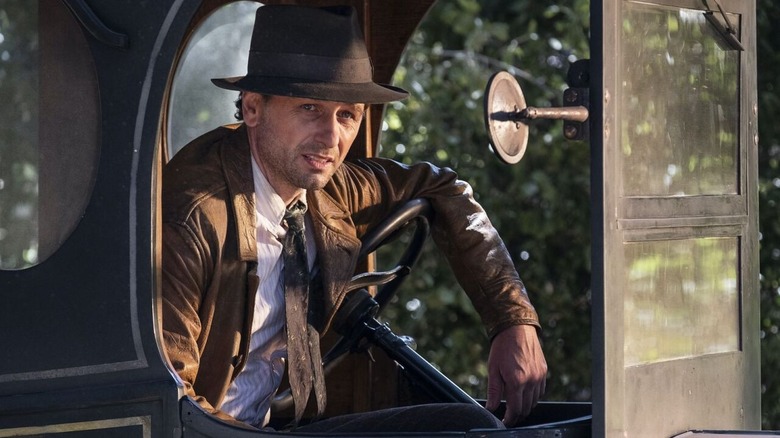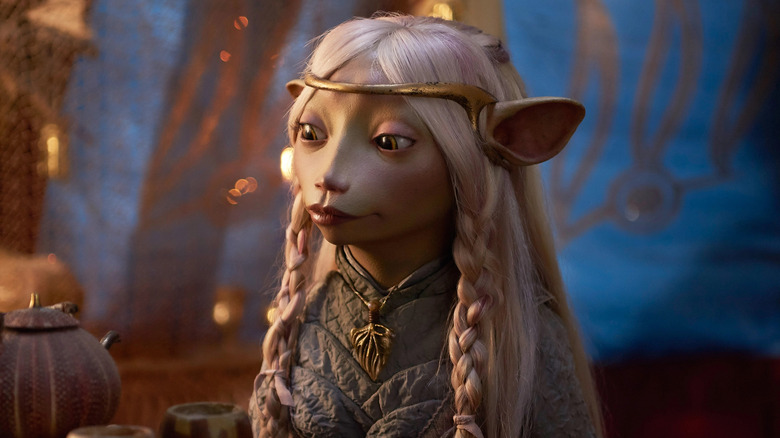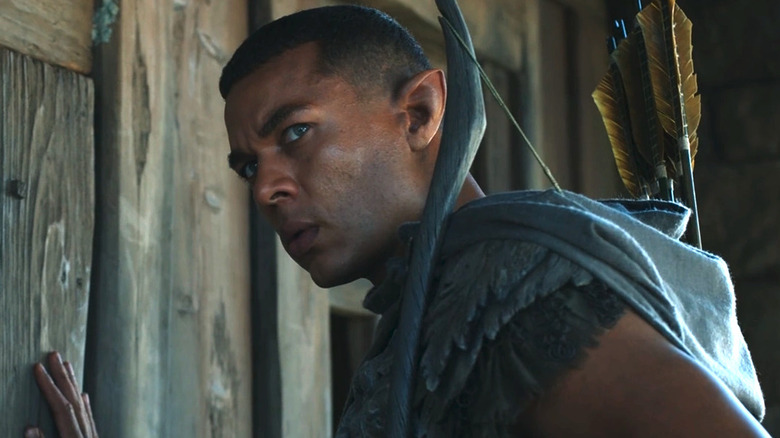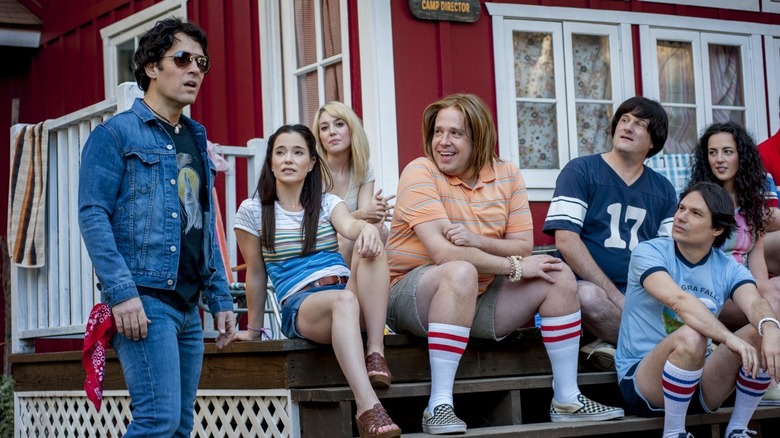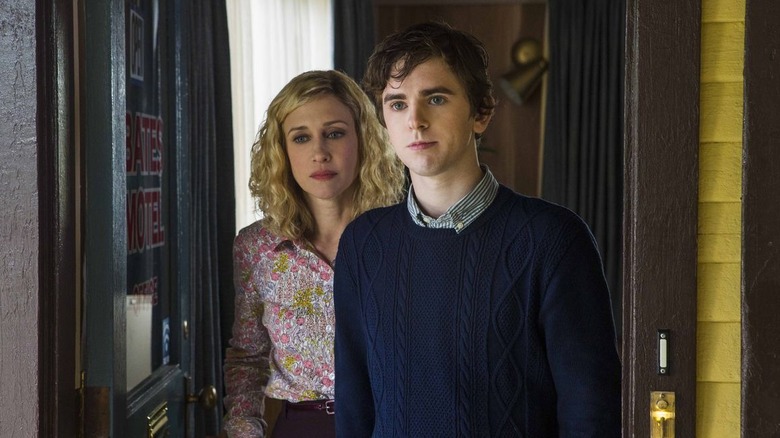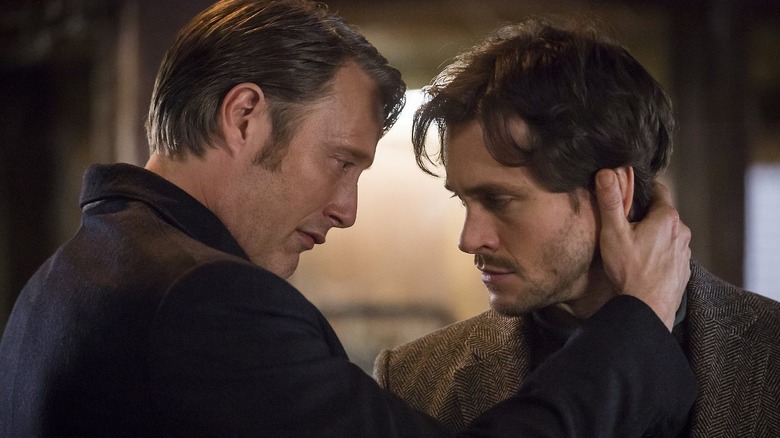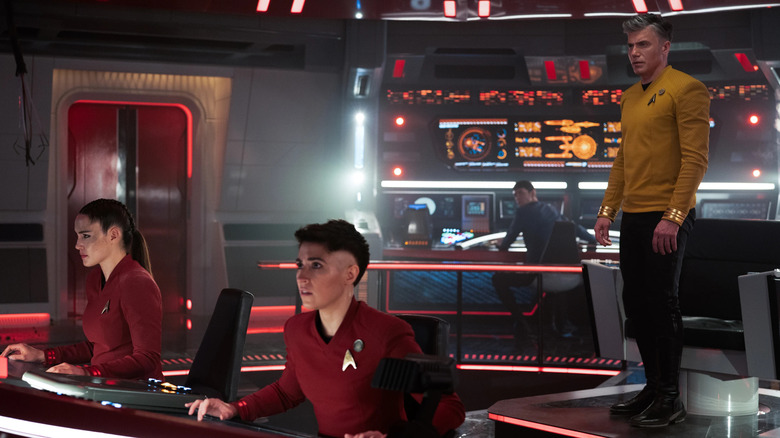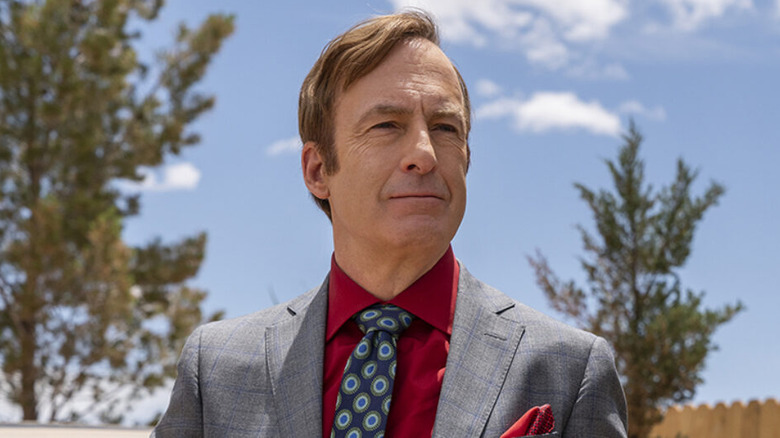The Best TV Prequels Ranked
Movie prequels have been around for decades, with some of the more famous being "Indiana Jones and the Temple of Doom" and "Butch Cassidy: The Early Years." They gained attention in the late '90s with George Lucas' "Star Wars" blockbuster prequel trilogy. Since then, the concept has fallen largely into disfavor, with many fans feeling that setting a story in the past is both uncreative and limiting. But not all prequels are created equal, and classics like "The Godfather Part II" and modern prequels like "X-Men: First Class" have used the format well.
Television, however, may be where the prequel has soared highest, with a number of great examples expanding on existing franchises to explore unseen histories of beloved characters and stories in the days before we knew them best. It's certainly true that setting a story in the past of an established world can be challenging, as the fates of certain characters are set in stone, and events must maintain a certain level of continuity. This limitation hasn't stopped many shows from becoming great, and in some cases, all-time classics.
If you've always thought prequels were a bad idea, it's time to think twice. We're looking backward, traveling back in time to before TV's greatest shows were ever born, and ranking the best television prequels that ever aired.
Smallville
DC's biggest superhero, Superman had been a mainstay on TV for decades, with at least three live-action series and several animated children's shows chronicling his costumed adventures. In 2001, the fledgling WB network launched "Smallville," a prequel about the hero's alter ego Clark Kent's adolescent years before he became a symbol of truth, justice, and the American way. Aimed squarely at teens, it focused on Kent's high school career and his friendships and rivalries with fellow students, including supervillain-in-waiting Lex Luthor.
Taking place in his hometown of Smallville, away from the big city Metropolis, the series starred Tom Welling as Clark Kent, Kristen Kreuk as Lana Lang, and Michael Rosenbaum as Lex Luthor. In it, Clark must cope with newly discovered superpowers while also trying to hide his alien nature from those around him. As new enemies emerge, Clark comes to terms with his abilities, but still can't decide whether to use them for good or keep them a secret for fear of being discovered.
Ultimately, "Smallville" had a strong, if at times uneven, run. It's remembered as a fun, light-hearted modern-day retelling of Superman's early years, mixing teen melodrama with satisfying superhero action. Running for nine seasons, the show played a key role in introducing the wider mainstream audiences to some of DC's best second-tier heroes, including appearances from new versions of Martian Manhunter, Green Arrow, Black Canary, and Cyborg.
Fear the Walking Dead
Adapted from the New York Times best-selling graphic novel, "The Walking Dead" launched in 2010 to critical acclaim, and has gone on to become one of the biggest television hits of the past 20 years. Set in a world besieged by a zombie apocalypse, it follows former Sheriff Rick Grimes and a band of survivors as they struggle to stay alive against both reanimated, mindless flesh-eaters and maniacal survivors who want to grab power for themselves. Given that the series was a smash hit, spin-offs were inevitable. In 2015, "Fear the Walking Dead" launched as a prequel showing the early days of the zombie plague.
At the beginning of its run, we meet a new ensemble cast of characters who are living ordinary lives when a global pandemic breaks out. The world quickly descends into chaos as the dead rise up to kill the living. Remarkably, the first three seasons of the series take place over the span of just two months, chronicling the onset of the zombie virus and how society broke down before the first episode of "The Walking Dead."
While later seasons take place concurrently with the early years of its parent series, the show's prequel nature was lauded for fleshing out the world of the zombie apocalypse. A gripping, engrossing thriller that in some ways topped its predecessor, it wasn't just a retread, with Variety calling the series "fresh, exciting, and suspenseful."
Caprica
A prequel to a reboot, "Caprica" hit screens in 2010, a year after the dramatic ending of the new millennium's best science fiction drama, "Battlestar Galactica." That series had been a relaunch of a short-lived sci-fi adventure from 1978, with former "Star Trek: The Next Generation" producer Ronald D. Moore turning the campy family adventure into a gritty war story that dazzled audiences with dark, sobering stories and unpredictable twists and turns.
Its prequel spin-off "Caprica" was entirely different: a sci-fi political thriller set decades earlier on a thriving world where A.I. technology is in its infancy. Taking place nearly 60 years before the Earth/Cylon war seen on the previous series, the show explored the relationship between two rival families, the Graystones and the Adamas, and saw the birth of the technology that would lead to the Cylon race.
Starring Eric Stoltz and Esai Morales as the family patriarchs Daniel Graystone and Joseph Adama, respectively, the series set itself apart from "BSG" with a focus on political and religious intrigue and profound personal drama. Packed with social allegory, "Caprica" was released to rave reviews from critics. The Guardian called the series "dense and intelligent sci-fi ... complex, bizarre and ambitious." Despite its acclaim, "Caprica" lasted just a single season and 19 episodes. Still, it's remained a cult favorite ever since.
Gotham
In the early 2000s, many "Smallville" fans wondered if the series might ever include a young Bruce Wayne, or make allusions to Gotham City or various Batman supporting cast members. While that never came to pass, a "Batman" prequel finally did arrive in 2014 in the form of "Gotham," a grimmer, harder-boiled crime series set in the city Batman would one day protect. In it, Bruce Wayne is a young boy far from becoming the Caped Crusader, so the series instead focuses more on Gotham PD officer Lt. James Gordon (Ben McKenzie) and his efforts to combat the city's criminal underworld.
With a supporting cast that included Donal Logue as Detective Harvey Bullock, Sean Pertwee as Alfred Pennyworth, and David Mazouz as a pre-teen Bruce Wayne, the series opened with the murder of Gotham socialites Thomas and Martha Wayne. As the show progressed, audiences met many of Batman's eventual rogues' gallery too, with future villains the Penguin, Catwoman, the Riddler, and later the Joker making appearances, as well as several original baddies like Jada Pinkett Smith as Fish Mooney.
Praised for its slick production and stylish storytelling, "Gotham" ran for five seasons, ending with a now-adult Bruce Wayne donning his cape and cowl and becoming the city's Dark Knight protector. A second prequel exploring the early days of Alfred arrived in 2020, titled "Pennyworth."
Young Sheldon
The late 2000s saw the decline of the multi-camera sitcom (via the LA Times), but one last effort in the timeless genre became one of the biggest hits on television. A series about a group of geeky pals, "The Big Bang Theory" starred Jim Parsons, Johnny Galecki, and Kaley Cuoco as Leonard, Sheldon, and Penny, three friends in Pasadena who fill their days with video games, comic books, and RPGs. A smash hit for 12 astonishing seasons, it expanded to become a franchise in 2017 with the debut of a prequel series, "Young Sheldon," about the awkward youth of child prodigy Sheldon.
Young actor Iain Armitage stars as the titular Sheldon, whose trials and tribulations include skipping four grades, making him a social misfit, but also an unlikely hero from time to time. Balancing a tough school schedule with problems at home, he also had to deal with the frustrations of having a dimmer-witted older brother George (Montana Jordan).
A heartfelt and heartwarming family sitcom that brings a fresh angle to the character with stories about Sheldon's social struggles rather than fast-paced madcap misadventures, "Young Sheldon" was a big hit. Its different approach helped make it achieve acclaim, with IndieWire calling out its strong mix of comedy and drama and its empathetic approach to the character.
Perry Mason
Forget "Law and Order": "Perry Mason" is arguably the longest-running legal franchise around, beginning life in the 1930s as a series of novels by Earl Stanley Gardner before coming to life as a series of films, a radio drama in the 1940s, and eventually a hit TV series in 1957 starring Raymond Burr that ran for nearly 300 episodes. Revived briefly in the 1970s as "The New Perry Mason," Burr returned to the role for a series of TV movies all the way through the 1990s. After a decades-long absence, the unflappable lawyer reappeared in the 2020 prequel series "Perry Mason," produced by Robert Downey Jr. and starring Matthew Rhys as the eponymous Mason.
Some years before becoming a renowned lawyer, Mason is shown in this darker drama as a beleaguered, hard-nosed private investigator whose business is struggling during the Great Depression. The series' first season tells a single story across its eight episodes, as Mason investigates a grisly child kidnapping and murder case.
Its strongest asset, however, might be its phenomenal cast, which includes Tatiana Maslany ("Orphan Black"), John Lithgow ("Dexter"), Shea Whigham ("Boardwalk Empire"), and Robert Patrick ("Peacemaker"), among many other standouts. Praised for its sophisticated story, compelling mystery, evocative style, and overall panache, "Perry Mason" built off decades of previous stories to provide a new spin on an old classic.
The Dark Crystal: Age of Resistance
Born from the mind of "Muppets" creator Jim Henson, "The Dark Crystal" was an iconic '80s family fantasy film full of ancient relics and mystical powers. It became an enduring cult classic thanks to its incredible design work, captivating story, and blend of light-hearted playfulness with a foreboding sense of doom. Though there had been talk of a sequel for years, it was actually a prequel that would eventually materialize: "The Dark Crystal: The Age of Resistance."
Released in 2019 as a Netflix original, the series was helmed by action director Louis Leterrier for the streaming service, and boasted an all-star cast for its ensemble of puppet actors, including Mark Hamill, Benedict Wong, Taron Egerton, Awkwafina, Jason Isaacs, Anya Taylor-Joy, Simon Pegg, Helena Bonham Carter, and Gugu Mbatha-Raw. Taking place long before the events of the film, "Age of Resistance" sees a group of childlike Gelflings on a journey to unite their people so they might fight back against the devious and tyrannical Skeksis that rule them.
Gorgeously produced with sumptuous visuals and a story that expanded on Henson's original, "The Dark Crystal: Age of Resistance" was a magical treat that did more than justice to a classic, making for a stellar fantasy series in its own right. Even with sky-high expectations, the series delivered a powerful story of friendship, loyalty, and indomitable spirit.
The Lord of the Rings: The Rings of Power
Director Peter Jackson's groundbreaking "Lord of the Rings" trilogy brought J.R.R. Tolkien's fantasy world to the mainstream in the early 2000s. Expertly realized with a lavish production budget, it quickly became an iconic, timeless trilogy. Following a trilogy of prequels adapted from "The Hobbit," many wondered where the franchise would go next, but it would be a decade before Amazon's "Rings of Power" prequel series landed in 2022.
"Rings of Power" is set in the Second Age of Middle Earth, long before the events of "Lord of the Rings," yet includes several crossover characters, notably immortal elves Elrond and Galadriel. As new evil rises in the East, the different races — Dwarves, Elves, Hobbits, and Man — prepare to rise up and meet it head-on. Making the most of Amazon's deep pockets, the series is a visual treat, a true spectacle that brings the cinematic experience to the small screen. Story-wise, it expands upon themes from Jackson's trilogy.
Strong performances, an intriguing story, and plenty of surprises have helped it garner critical acclaim too, with Variety calling it "a perfectly winning adaptation that unfolds swashbuckling adventures with clear reverence and affection for the considerable mythos behind it." A massive success for the streaming giant, it's anyone's guess where the series will go following its debut season, but it's already proven itself a worthy addition to Tolkien's world.
Wet Hot American Summer: First Day of Camp
In 2001, the comedy troupe known as "The State" produced an offbeat comedy film, "Wet Hot American Summer," that followed the wild antics of a group of teen counselors at a traditional 1980s summer camp. Members of "The State" starred and were joined by a remarkable cast, including then-young actors Paul Rudd, Bradley Cooper, Amy Poehler, and Elizabeth Banks alongside veterans David Hyde Pierce, Molly Shannon, and Janeane Garofalo. Though it flopped in theaters, its surrealist humor and raunchy tone helped it become a bonafide cult classic. More than a decade later in 2015, a prequel series arrived on Netflix, "Wet Hot American Summer: First Day of Camp."
Leaning into the ridiculousness of the elapsed time between the original and the prequel, the entire cast — now 15 years older — all returned, still playing teenagers in a story set several months before the film, on the first day of summer camp in 1981. Even Rudd, Cooper, Banks, and Poehler, who had since achieved megastardom, came back for the eight-episode series, with the likes of Chris Pine, Lake Bell, Kristin Wiig, and Jason Schwartzman joining them.
Lauded by critics for its wild, off-the-wall comedy, the show became a big hit for Netflix. In 2017, it was followed by a sequel series, "Wet Hot American Summer: Ten Years Later."
Bates Motel
Alfred Hitchcock's "Psycho" was a seminal 1960s thriller that gave rise to the modern psychological horror genre almost single-handedly. Starring Anthony Perkins and Vera Miles, it centers on a young woman who winds up in a hotel run by Norman Bates, a twisted madman whose obsession with his own mother turns him into a killer. A Hollywood classic and box-office smash, it was followed by a series of lesser sequels and even a TV movie called "Bates Motel" in 1987. In 2013, when the title was repurposed for a prequel television series starring Freddie Highmore as a young Norman Bates, no one had particularly high hopes.
The series introduces a teenaged Norman Bates (Highmore), whose mother Norma (Vera Farmiga) purchases a motel for them to turn into a business after the death of her husband. Trouble strikes, however, when Norma is forced to kill a dangerous attacker, leading to a series of cover-ups and conspiracies that threaten to expose them both. Troubled by the violence around him, Norman's fragile mental state deteriorates. As he slowly spirals into madness, his mother struggles to deal with his worsening condition.
Focusing on the disturbing relationship between mother and son, "Bates Motel" is a riveting psychological thriller for five seasons, with its final year serving as a jaw-dropping remake of the film. Becoming a new classic in its own right that the LA Times called "twisty, mood[y] [and] modern," the series is a blueprint for how to craft a clever, fresh prequel to an iconic franchise.
Hannibal
The 1991 film "Silence of the Lambs" brought author Thomas Harris' novel to the big screen with aplomb, with star Anthony Hopkins giving a spine-chilling — and Oscar award-winning – performance as the sociopathic serial killer Hannibal Lecter. Technically, this was Hannibal's second big-screen appearance, as he also featured in Michael Mann's 1986 flick "Manhunter," and he appeared again in prequel films like "Hannibal Rising" (2007) and "Red Dragon" (2002), as well as the sequel "Hannibal" (2001).
As for the small screen, Danish actor Mads Mikkelsen ("Casino Royale") took over the role for a 2013 TV series simply titled "Hannibal," which chronicled the years before Lecter was imprisoned for a series of cannibalistic murders.
Drawing mostly on material from Harris' novel "Red Dragon," the NBC series saw renowned psychiatrist and secret killer Hannibal Lecter (Mikkelsen) assisting intrepid FBI agent Will Graham (Hugh Dancy) as a criminal profiler on his toughest cases. Created by Bryan Fuller ("Pushing Daisies"), the series reimagined the relationship between the two future adversaries, as Lecter — whose murderous inclinations are explored in secret — becomes obsessed with the young FBI agent. Dark, disturbing, and bold, "Hannibal" pushed the boundaries of television censorship, and was rewarded with universal acclaim.
While the third season incorporated the story from "Red Dragon," the series was unceremoniously halted before plans to adapt "The Silence of the Lambs" could come to fruition. The pinnacle of crime fiction, its powerful performances, engrossing story, and sheer psychological terror have made it an all-time classic. Though revival rumors have swirled for years, it's sadly looking like we've seen the last of Mikkelsen's version.
Star Trek: Strange New Worlds
"Star Trek" had done prequels before, with the 2001 series "Enterprise" set in the early days of Starfleet. A triumphant return to television in 2017 after a 12-year hiatus, "Star Trek: Discovery" also takes place in the past, just a decade before Kirk and Spock. In that show's second season, we meet Captain Pike and the U.S.S. Enterprise. In 2022, their story spun off into its own series called "Star Trek: Strange New Worlds." Starring Anson Mount, Ethan Peck, and Rebecca Romijn as classic characters Pike, Mr. Spock, and Number One, it explored the early missions of the Enterprise that had only previously been hinted at.
Joined by a mix of returning franchise icons like Uhura (Celia Rose Gooding), Nurse Chapel (Jess Bush), and Dr. M'Benga (Babs Olusanmokun), plus new characters La'an Noonien Singh (Christina Chong), Ensign Ortegas (Melissa Navia) and Andorian engineer Hemmer (Bruce Horak), the series was a retro return to sci-fi adventuring. While "Star Trek: Discovery" and "Star Trek: Picard" were focused on darker, more adult-themed serialized stories, "Strange New Worlds" successfully recaptured the classic "Trek" spirit with family-friendly episodic stories that took the crew to new worlds each week.
With a strong cast and a big budget, the series refreshed the final frontier, and "Strange New Worlds" was hailed a return to form with a stirring mix of big adventure, thought-provoking science fiction, humor, and heart.
Better Call Saul
Creating a spin-off of an acclaimed series can be risky, as no matter how good it is, it may always live in the shadow of its parent series. Such was the predicament when the 16-time Emmy Award-winning "Breaking Bad" announced that supporting star Bob Odenkirk would lead an unexpected spin-off series, "Better Call Saul." The fact that it would be a prequel — an always-controversial choice — and would run alongside the final seasons of "Breaking Bad," made it even trickier.
Debuting in 2016, Odenkirk and series creator Vince Gilligan pulled off the impossible. Greatly expanding on Odenkirk's unscrupulous lawyer Saul Goodman, the show explored more of his shady past and underhanded dealings, while appearances from Giancarlo Esposito as Gus Fring and Jonathan Banks as Mike Ehrmantraut helped flesh out the "Breaking Bad" universe by enriching old stories with new context. In time, the events of the series caught up with its predecessor, which even allowed for the brief return of Bryan Cranston as Walter White.
With a more left-of-center vibe and a colorful cast of quirky, eccentric characters, "Better Call Saul" was a series with its own identity while still delivering gut-wrenching, nail-biting crime stories. Standing on the shoulders of a giant, the series may have soared even higher, with The Guardian declaring it even more profound, and outstripping Gilligan's former series in nearly every way.
